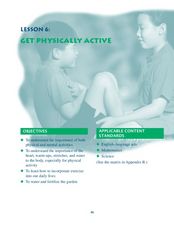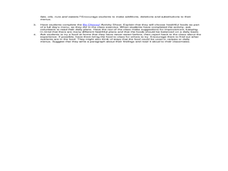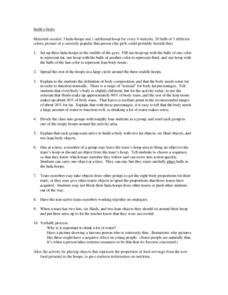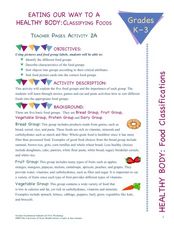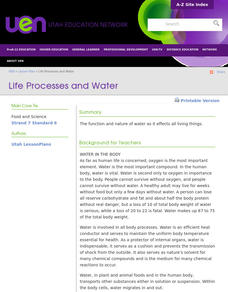Curated OER
Basic Vitamins: Water-Soluble and Fat-Soluble
An incredibly thorough instructional activity on vitamins, and how to keep one's body at peak health. Learners access a variety of excellent worksheets embedded in the plan that have them consider raw vs. cooked foods, a vegetable...
Project WET Foundation
Healthy Water Healthy People
People and water have something in common. They both need to be healthy. Explore with an engaging interactive what it means to have a healthy body and why having healthy water is also important.
Baylor College
Water in Your Body
Do you know how much water you have had in the last 24 hours? Do you know how much your body needs? In this hands-on activity, your class members will estimate how much water our bodies lose each day by filling and emptying one-liter...
Curated OER
A Healthy Diet is a Balancing Act
It's important to teach kids how to have a balanced diet. They are provided with six different meals, they fill in the blanks to complete each one to make it balanced. The answers could be anything and the meals offered don't seem very...
State of Victoria
Making Healthy Choices, Making Healthy Food: 4-6 Curriculum Support
How much water should we drink every day? How can food preparation be both healthy and satisfying? Check out this great 10-lesson unit which not only covers the body's need for water, but also includes lessons on tasting and storing...
Michigan Sea Grant
Water Quantity
It may be tricky for a young mind to conceptualize that less than 1% of all water on earth is useable for humans to drink. Simulating the amount of fresh water available on earth by removing measured amounts of water from a five-gallon...
Curated OER
Importance of Water
Students complete a KWL chart on what they comprehend about water. They complete a water activity determining how much usable water is available, and they determine the water usage in their households. Students take notes on water and...
Curated OER
Get Physically Active
Students discover the importance of water. In this physical education science lesson plan, students consider mental and physical activities. Students find their pulse and measure their heart rate. Students discuss the...
Curated OER
Our Healthy Bodies
Students complete a variety of activities designed to enhance their awareness of their bodies. They examine pictures of themselves, taken at various points in the year and examine and compare their bodies. They enjoy a healthy snack...
Curated OER
Water, Water Everywhere
Students explain the important role of water in the body. In this adult health lesson, students examine foods with high water content. They share ways to get the recommended amount of water per day.
Curated OER
Be Kind to Your Teeth
What kinds of food can be bad for your teeth? Kindergartners and first graders explore dental health with an interactive science inquiry. Given a choice of foods such as celery, cake, and milk, kids choose which ones are better for their...
Science Teachers
Organ Systems Crossword Puzzle
An attractive and informative body systems crossword plus its answer key is provided for your life science learners. The topic is the organs. With 23 prompts to address, they are sure to get a complete review in identifying the systems...
Michigan Sea Grant
Water Quality
Learners observe water samples and measure the samples' water quality. Students develop their own criteria for measuring water quality and test for temperature, acidity, oxygen levels, turbidity, conductance, sediment and hardness.
NOAA
It All Runs Downhill
Examine how pollution makes its way into an ocean with help from a model watershed. Scholars use household items to recreate a mini-watershed, equipped with pollutants, that when mixed with rain drain into a model's body of...
Curated OER
How Do Foods Help Our Bodies
Students investigate the specific elements found in food that keep us healthy. In this healthy eating lesson, students identify proteins, carbohydrates, minerals, and vitamins as part of a healthy diet when consumed in moderation....
Curated OER
Build A Body
Learners explore the concept of body composition through a hands on activity. Working in groups, they create a body model using objects found in gym class. Students calculate the percentage of elements in the body they have composed.
Curated OER
Water 1: Water and Ice
Students explore the water cycle. In this water cycle lesson, students complete a hands-on activity that replicates the water cycle. Students record their observations.
Curated OER
Non-Nutrients: Fiber and Water
Students discuss how much fiber and water a person needs each day. They use beans soaked in water to show the benefits of water to the human body. They also learn the health benefits to eating healthy.
Curated OER
Eating Our Way to a Healthy Body: Classifying Foods
Students examine the major food groups. In this classifying foods lesson, students discover the 5 food groups as they read books and play games. Students then sort foods into the appropriate food groups
Curated OER
Benefits of Nutrients
Explore the nutrients a body needs using this resource. Learners discuss the importance of the relationships between proteins, fats, carbohydrates, vitamins, minerals, and water. It's a great way to have your class talk about the healthy...
Curated OER
Healthy Colon with Good Digestion and Fiber
Sixth graders learn about the colon and what it does. In this lesson about digestion and the colon, 6th graders analyze what this organ's job is. Students complete four activities where they explore the importance of fiber, the makeup of...
Curated OER
Survival: The Human Body in Extreme Environments
Students create a list of signs the human body gives during threatening weather conditions. They investigate the causes and conditions of dehydration, overheating, and hypothermia.
Curated OER
The Human Body
Students make life-size models of their bodies by having a partner trace them. They glue the basic body parts in the proper places and decorate them with hair, and facial features.
Curated OER
Life Processes and Water
Explain the properties of water. Identify the properties of water that make it a polar molecule Describe hydrogen bonds and how they differ from covalent bonds Discuss the differences between hard water and soft water Compare the heat of...









